Pleasant Valley Theater Alums Share Experiences Before and Since Pandemic
Saturday In The Arts is a weekly look at a personality, place, trend or topic of interest to the Quad-Cities. It runs every Saturday morning on your site for fun, free, local entertainment and features, QuadCities.com.

Samantha Pauly, a 2008 graduate of Pleasant Valley High School in Bettendorf, was set to co-star in one of this year’s most anticipated new musicals on Broadway, “Six.”
A flashy, feminist retelling of the lives of the six wives of Henry VIII (as a high-tech pop concert), the show played a month of previews in New York City and was to open March 12 at the Brooks Atkinson Theatre. That was the night Covid-19 shut down all of Broadway, and it’s not expected to re-open until next summer at the earliest.
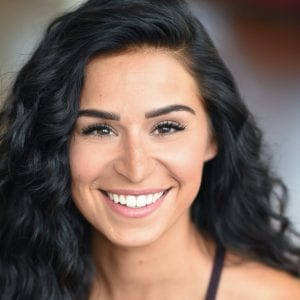
Sam Pauly is based in Chicago.
Pauly was among seven PV theater alums and three other friends of high school drama director Christina Myatt to take part in an online panel recently, to talk about their accomplished careers and how they’ve handled the pandemic. The 90-minute Google Meet discussion on Nov. 30 was displayed for the PV students in the theater, who submitted questions ahead of time.
“They are talented and committed and have the drive,” Myatt said of her charges at the end of the event. “And I think it’s wonderful that they have the opportunity to talk to people such as yourselves, who can come in and share with them the ups and downs, the things that will continue to inspire them. So that they know that even somebody from a little town in Iowa can someday be in New York and be on Broadway. That’s a really great thing for them to know.”
“I appreciate that during a pandemic, when all of you are struggling, that you take the time to come and be here for these students,” she said. “That means a lot to them; it means a lot to me personally.”
PV junior Grace Engstrom, who’s the drama club vice president, helped plan, organize, publicize and run the professional panel.
“It went a lot smoother than I thought it would,” she said Thursday. “They were all super nice, so excited to come talk with us. I think we had a really good turnout, honestly.”

Samantha Pauly as Katherine Howard in “Six.”
“Hearing some of the backstage stuff was so cool,” Grace said. “Being in high school, we’re still able to do stuff in a different way, but over the summer I hated not being involved. I was cast in ‘Matilda’ at Quad City Music Guild and that got postponed. Having that get canceled was really hard for me.”
“Just thinking how the big Broadway stage is just lights off right now, and shut down, is just crazy and thinking about that being their only job is scary,” she said of the panel guests. “I was really impressed with the different ways they’ve found to make a living during the time – doing voice lessons, renovating an RV, was really cool.”
Last year, Grace was part of a similar panel discussion, but much smaller. This year, she was impressed by how many people they got, from a variety of fields.
“I really enjoyed hearing what they had to say,” she said. “We had a lot more professional people, and a lot more different backgrounds.”
That helps open theater students’ eyes to the kind of career paths that are available.
“I talked to one of my friends who likes to do lighting and sound. I didn’t know before I came to high school that pursuing theater was a very logical and a stable job you could do,” Grace said. “But hearing all the stuff that people did, and two of our PV alumni have been on Broadway, so that intrigued the students especially.”
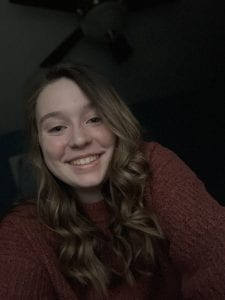
Grace Engstrom, a junior, is vice president of the Spartan drama club.
One student was familiar with Sam Pauly being on Broadway, but didn’t know she went to PV, so she was overjoyed, Grace said. “She was shocked, you can live in Bettendorf and still accomplish so many amazing things.”
“I really hope that students who might be more on stage start to explore crew,” she said. “Right now our crews are limited to like four people per crew because of Covid. For our children’s show this year, I’m costume head for the first time and already, the experience is just crazy and I love getting to experience the different ways you can be involved in theater.”
“I hope students, after watching the panel and seeing how many cool and different things you can do with theater, it can be just so amazing,” Grace said. “I hope students take that away and explore the hair and makeup things, or the set, lighting and sound.”
Getting students to work backstage gives them a better understanding of the final product, she said.
“Being part of props and set before, I just have a greater appreciation of what people have to go through, and I think it just makes you a better performer overall,” Grace said.
She’s planning to major in musical theater in college.
Maintaining modesty and humility
The group panel included veteran actor-director-educator Michael Vincent Carrera (who taught theater for a year at Augustana College, where Myatt works), 2020 Augie grad Jonathan Quigley, a freelance video editor, and longtime “Wicked” crew member Craig Aves, who went to high school with Myatt in New Jersey.
She asked them how they were able to maintain their “Iowa nice” personalities, having achieved success in New York and Los Angeles.
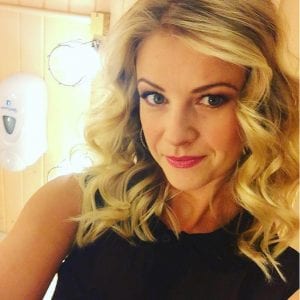
Whitney Bashor backstage in 2015.
“It’s really easy to stay humble, when you go to that dance call and kick a girl in the face accidentally, and you go to your Broadway show and you go on the subway to go home and there’s someone like peeing on the subway,” said Whitney Bashor (class of ’01), who was in the original Broadway cast of “Bridges of Madison County” (2014) and was cast in the new Michael Jackson musical on Broadway (now to set to open September 2021).
“Yeah, this is the reality. It presents as this very glamorous career, but behind the veneer of the lights and the costumes, and those two hours you spend in the theater, every other part of it is very hard,” she said in the panel.
“You’re humbled by the realities of your career,” Bashor said. “And also, like your friends and your family, all these other things you feel your life with also ground you and humble you.”
“I still love going to Broadway shows and love seeing the magic and get very emotional,” said Pauly, who played Katherine Howard in “Six” in Chicago and also been the title role in “Evita” in London. “What I think about is, how devastated I would feel if I ever met one of my theater idols and they turned out not to be a great person, like how disappointing that is.”
“That’s also the magic of theater – we dress up and put on these fancy things, but I also like to go home and put sweatpants on and eat chicken nuggets after a show,” she said. “I get on the subway and nobody has any idea who I am, like it doesn’t matter. We do important work and it’s really magical, and it gives people an escape for a couple hours, but we’re not like saving the world. I feel like that brings me back down.
“We’re doing a job; I did my job for the day,” Pauly said. “Theater is important, obviously, but there plenty of times where I’m like, I’m not saving a life today like a doctor…It’s that simple; it’s easy to be nice.”
Her credits include the lead in Circa ’21’s production of “Legally Blonde,” but Pauly said dancing isn’t her forte, especially tap.
“I get hired for my voice over other things,” she said. “Along comes a show like ‘Six,’ if I watched it before I was in it, I’d say ‘I cannot, I could

Whitney Bashor performing in “The Bridges of Madison County” in 2014.
never.’ But if you’re making yourself take a couple dance classes here and there and try to stay on top of things, you’ll be fine. You will go to
dance calls and you will embarrass yourself, and feel like a fool. That’s OK.
“There have been dance calls I’ve been asked to go to, tap ones, that ‘Anything Goes’ is not my show,” Pauly said. “They say come in anyway, it’s a singers’ dance call, and it’s still been really bad. That’s OK; it’s gonna happen. Just like, try your best and have fun. In the end at a lot of these dance calls, they want you to have fun. There have been so many where I’ve stopped mid-dance call and say, nope, not even close.”
“There are still plenty of things you can do,” she said, noting “Six” has the most dance of any of her shows. “Find out what you’re good at and focus on that, on those shows that will really show who you are.”
Bashor knew she wanted to work in musical theater since she acted at PV.
“It was the thing that made me feel the most lit up when I did it. Like I didn’t feel like I was working when I did, but I felt I was collaborating and playing, and when I realized there was a world in which someone could get paid to do that, I thought that sounds really amazing,” she said.
“I was encouraged by really good teachers in high school and I was encouraged by really good teachers in college,” Bashor said. “But I think it honestly has less to do with how good you are and more to do with how tenacious you are. I don’t think people necessarily don’t work because they’re not good enough.
“But I think a lot of people stop working because they’re tired of how hard the profession is. I think you have to just keep re-assessing whether or not you want to put yourself through the realities of the business, and there is no shame in ever saying, ‘I’m tapping out, I’ve had it.’ Your tenacity will be tested again and again, and it’s something you’ll have to revisit your whole career,” she said.
How do you deal with rejection?
Show business is a brutal business where aspirants have to deal with a lot of rejection, and Myatt asked how they handle it all.
“I’ve learned that rejection is a part of the job, especially if you’re going into theater as an actor, a performer,” said Quigley, who’s been fairly busy as a video editor this year. “You could be a really great actor, but if you go audition for a show and you’re not quite what they’re looking for, they say, ‘All right, thanks for coming, see ya.’ It kind of becomes sort of – I view it as a never-ending battle you have to keep getting up, pull out your sword and try again.”
“It’s part of the job you begrudgingly accept,” he said. “You take it for what it is and keep moving forward. Part of why I like doing tech is, you don’t get told, you have a lot of great qualifications but you’re not quite what we’re imagining. When it comes to tech, it’s – you’ve done this
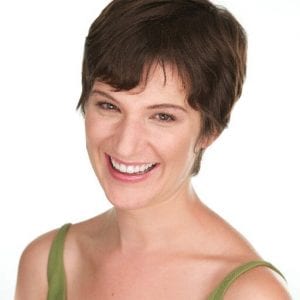
Katie Consamus
many shows, you seem very qualified, yeah, welcome to the team.”
Aves – who’s worked as stagehand and head electrician for the hugely popular “Wicked” on Broadway — said when you get rejected, to be gracious.
“I’ve gotten a lot of jobs where I wasn’t their first choice, but their first choice had a schedule conflict or turned out to be a jerk,” he said. “Suddenly my phone rings, and if you’re graceful about it – not screw you – and say, if I can help at any time, sometimes they do.”
“You have to get to a point where the job is not necessarily the job you’re going for,” said Hannah Holmes (class of ’09), who has worked mainly in choral music and operetta in New York. “The job is auditioning, presenting yourself as best you can and not worrying about what they’re looking for specifically.”
“It starts to become not personal in a good way, but if there’s something I’m really attached to, I’m going to leave the space and obsess afterwards whether I’m gonna get it or not get it,” said Katie Consamus (class of ’02), who’s a Minneapolis-based actor and curriculum director for a children’s art studio (https://kidcreate.com).
“Someone told me once, she described it as the Catwoman effect,” she said of auditioning. “If she was really attached to something, she’d make all her notes, whatever, and how it went, she’d file it away and never think about it again and as she was walking out of the building – she’d imagine herself like Catwoman, just blowing it up behind her.”
“New York and the Broadway scene is a rat race as it is,” said Amelia Bay (class of ’10), who’s had a very successful career doing hair and makeup for Broadway and TV.
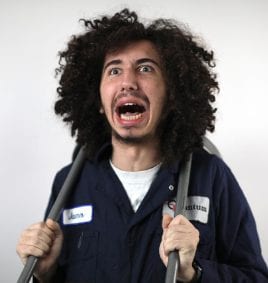
Jonathan Quigley
“It’s so much, especially on the acting side, it’s just a small pond with a lot of fish that are wanting to all get in,” she said. “My hope is it doesn’t get so much more competitive, because everyone is even more hungry for the work. I think has been the conversation we’ve continued to have. My hope is there’s enough opportunities and work to fill everybody that’s wanting to be in this industry.”
A few described the process of becoming a member of the Actors’ Equity Association union.
“It’s not something that’s required for actors, but what the union does is, you can get health insurance. It also provides protections to actors, in terms of safety in a theater and rights when you work at a theater,” Pauly said. “There’s different tiers of contracts, and from the union, there are certain minimums they have to pay you. It not only protects me, but it protects the theaters.
“There’s non-union work and union work,” she said. “Once you have joined Actors Equity, you can’t work at non-union theaters anymore. If you want to, you have to leave the union. To get one Equity point, you have to work a week at an Equity theater. When you get to 25 points, you can choose to join the union. It used to be, you could defer and not join.”
Candidates must complete at least 25 creditable weeks of work at any of the participating theatres. The weeks do not have to be consecutive and may be accumulated over any length of time, according to www.actorsequity.org/join/emc.
“It makes a difference if you’re a musical performer, there are a lot more jobs in theater,” Carrera said. “It does pay for musical performers to get their (Equity) cards early, because you can be young and do chorus work. There’s lots of need for that. If you’re a straight actor, and you’re a character person, you may not be working in union jobs until your 30s, 40s, or 50s.”
“There’s all of these roads you have to navigate and it’s particular to each person, really,” he said.
Expanding horizons of career paths
While performing is the most glamorous of theater careers, the group agreed that it’s important for students to explore all their options.
Jenny Smith Cohn (PV ’04) did a lot of crew in high school and now is in charge of marketing and communications for Boston Court, a theater in Pasadena, Calif. She’s been in southern California for 12 years, after earning her bachelor’s in theater from Tulane University.
“I was one of those people in high school who did a little bit of everything. I just loved to be part of the team,” Cohn said. “I wanted to be part
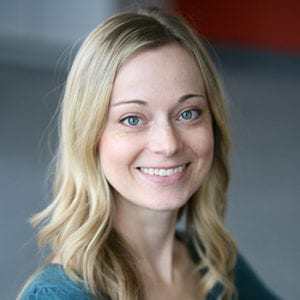
Jenny Smith Cohn
of the show, making that magic. That has been my driver through my whole professional career – I just want to help create the show in some way. I want to be creating the magic that audiences are getting swept away by.”
“In order to do that, when you love theater and all aspects of theater, when you want to, you can work in all those aspects,” she said. “It’s all learnable. For me, it was about finding the people I really loved to work with, and create that magic with, and just sticking with that. That’s been true, how I kind of evolved. The theater I work at now, I started as the stage manager there, and then I was a props designer for a couple shows and I got a part-time job doing some membership stuff.”
“I really think, if there’s a place that makes you feel at home and you value the type of artistic work they’re doing, that’s really been the most important thing,” she said. “And the actual job, I’ve learned as I’ve gone on. It’s always changing – now we have social media managers that didn’t exist when I graduated from college. Now, of course we have virtual production managers, and people learning to operate video switchers in the theater, which have not had happened pre-pandemic. We’re just learning what do we need to make this magic happen, and dive in and give it a try.”
Comparing high school and real life, Cohn said the work ethic is very similar.
“You learn in high school you’re doing theater on top of all your schoolwork and other activities you might have. That ability to just do a lot of work in a short period of time is very useful, I think, regardless of what you wind up in,” she said.
“I was a freelance prop designer for 10 years,” she said.
“It’s a lot of like, you work for this theater for three months and you do summer stock at this theater and you do the fall season over here. It’s a lot of moving around, which was very, very fun for a while. And then I was ready to like have an apartment and be able to own some things that didn’t necessarily fit in my car. I think the work ethic is similar to high school, but unfortunately you have to grow up, which sounds like a bummer.”
“You have to pay your bills and eventually like, maybe have a kid, and it’s harder to do all that stuff if you’re constantly moving around,” Cohn said. “I’d never thought I’d be in L.A., but it’s been very good for me to work in a lot of theaters. There’s 350 theater companies in Los Angeles – a lot of people don’t know that. There’s a lot of work out there, both union and non-union work.”
“I think the friendships you have in high school will outlast you guys going off and doing other things,” she said. “I still have friends from high school, we talk a lot. I haven’t seen Katie in a long time, so it’s nice to see your face. Your needs for your jobs change as you grow older. I have a toddler now, and being able to be home and be with him. So having a job in theater that’s more 9 to 5 has worked out very well for me.”
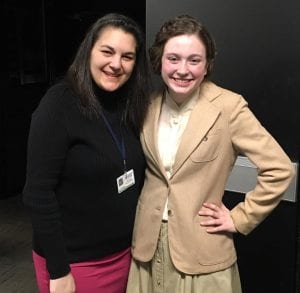
Christina Myatt, left, with Grace Engstrom. (Jenelle Shamrell Photography)
“On the tech side of things, I realized you can always learn the things you don’t know,” Cohn said. “When you’re offered jobs or positions that have some skill you haven’t learned yet, there will always be someone who will teach you how to do it.”
She learned welding that way. “You can always say yes to taking the job and there will always be more experienced, wonderful, friendly people to teach you things you don’t know yet,” she said.
Quigley said he didn’t plan on making theater a career, but enjoyed the work, including for the professional summer stock Mississippi Bend Players at Augie.
“There’d be plenty of times I looked at something I did, and could find a million reasons why it was like this is bad for this many reasons, but if you do it long enough, people start telling you, ‘I thought it was pretty good.’ In my case, I still always have that voice that says, this could be better,” he said. “I like to think of that more as desire to keep pushing the boundaries, not being satisfied.”
“As long as you’re tenacious and keep doing it, practice makes perfect,” Quigley said. “Eventually, you fall into what it is you realize, this is what I want to do and this is amazing. And suddenly, nothing can stop you from doing it.”
Carrera’s varied career has included dance, acting, directing, casting director, theater, film, TV and being an educator. He got his MFA at the University of Iowa, now works in New York, teaching theater classes at Iona College in upstate New York.
“I get a lot of students who don’t become professional performers who major in theater, or don’t become professional technicians. The great thing about having a theater background is, it prepares you for a lot of other things that are really vital to the world,” Carrera said.
“Communication skills are waning, especially oral and written communication skills – and those are our bread and butter,” he said. “There are skills we have as artists that are applicable to so many other areas of life. I guess I did all those different things, not only because it’s hard to make a living in any given one, but y training prepared me to do them all. Plus things that lie outside the arts.”
“Performing grabs you by the neck and doesn’t let go,” he said. “It’ll always be the first love. I do the other things, honestly, to support my performing habit. If I never had to teach another class again, I’d be fine with it, not that I don’t like teaching. There’s nothing like stepping
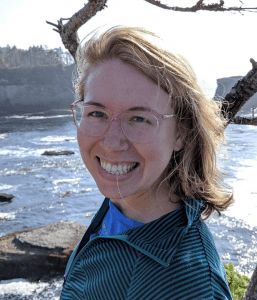
Hannah Holmes
into the shoes of another human being and telling someone else’s story – and giving it integrity and honoring it, and showing it off to the world.”
“That is the biggest high that an actor can have,” Carrera said. “We actually get to tell the lives of other human beings. I take that as a personal honor to be able to do that. Stories that are 500 years old or stories that are new today, there’s a lot of honor in telling Shakespeare’s stories as there is in telling Suzi Lori-Parks’ stories or Lynn Nottage’s stories.”
“Being a storyteller is a noble calling, because right now more than ever, we need to hear stories of our common humanity, and that’s what performing artists do,” he said. “Whether it’s through dance or music or art or acting.”
“The ability to meet people is like the best skill you’ll have. Knowing who’s in charge, finding a way to help people who are in charge, finding a way not to step on the toes of those who are in charge at this moment, but are going to be leaving soon – that’s an incredibly useful skill,” Aves said.
“It’s being able to create a team and getting the team to work with you,” he said. “That’s worked its way up from high school to college, to the road, to Broadway, has gotten me this far.”
“I remember in high school being a bummer that I would be doing lights,” Quigley added. “No one wanted to be stuck doing tech, because people wanted to be on stage. In the professional world of tech and design, you realize, this is awesome,” he said. “You get a totally different view of the whole theatrical experience, versus just being an actor. I think acting is a lot of fun, but going to a production meeting and

Abby Kurth
working with the director, the sound designer, the lighting designer, the costume, props – it feels like you’re part of a much larger picture than just acting.”
“You get a say and a voice in the overall direction that a show goes,” Quigley said. “You get to contribute your own ideas and aesthetics for how you feel this show should be best brought to life.”
Abby Kurth (class of ’15 and Hannah’s sister) graduated from college in 2019, with a bachelor’s in music, moved to New York City that fall, and knew she wanted to do music and theater.
“I still don’t really know I’m good, but I like it,” she said, noting she worked on a national tour for two months, then there was nothing.
“I don’t think it’s a bad thing to not necessarily know this is exactly what you want to do,” Kurth said. “I don’t know for sure I want to keep performing, but there’s a lot of different things you can do in the arts world.” That includes administration and education, she said.
Since the spring, Abby has been back in Iowa, teaching a jazz choir at PV now, nannying and teaching a couple piano and voice lessons.
Surviving during the pandemic
Bay and Aves have had two massive career shifts since the Covid shutdown in March.
Starting in makeup at PV, Bay went to the University of North Carolina School for the Arts, getting a bachelor’s in hair and makeup design, then went to cosmetology school for year and a half, and joined a hairstylists union.
“Getting into the industry is more word of mouth – who you know and who recommends you,” she said.
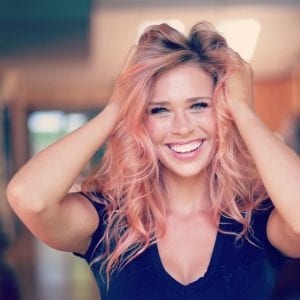
Amelia Bay is primarily a hairdresser for Broadway and TV.
TV shows Bay has done include “Law & Order: SVU,” “Jessica Jones,” “Marvelous Mrs. Maisel,” “The Plot Against America,” and recently the new limited series “Monsterland” for Hulu.
On Broadway, Bay has done “Aladdin,” “Book of Mormon,” “Jersey Boys,” “Phantom of the Opera,” “Wicked,” “School of Rock,” “Be More Chill,” and was Laura Benanti’s personal hairstylist for “She Loves Me.”
With the pandemic, Bay and her fiancé Dave Brown pivoted, wanted to do something creative and fulfilling, so they started renovating a vintage RV, and are filming for a YouTube channel, “BB and the RV.”
Brown is an actor who was playing the lead in the musical “Book Of Mormon.” On YouTube, you can follow their journey as they turn a 1979 Dodge Cruise-Master “into a sweet sweet Pinterest-Etsy-Anthropologie love child!” he says on a YouTube video.
They’re now living with his parents in North Carolina and collecting unemployment.
“We’ve always had this dream of working and creating and making something together,” Brown says in the video. Bay says: “Are we out of our minds and highly underqualified? Follow our journey to find out.”
Aves said since the pandemic, he’s been working stock at a Williams-Sonoma store.
“I now know more about coffee makers than I never knew existed,” he said. “When ‘Wicked’ comes back, I hope I’ll be invited back, but until then, that’s gonna be summer at the earliest. I had to go resume in hand and had to explain what everything on the resume meant…They took me and now I lift boxes.”
Holmes said during the pandemic, “It’s been tough. My husband and I are both freelance musicians, mainly. We both got unemployment and we’re able to live off our savings a little bit. I’m very fortunate I have a job, singing in a professional choir at a church in New York, and they have found ways to make it happen, or sometimes pay me not to come in at all.”
Bashor teaches voice online and collects unemployment. Pauly, in Chicago, also is teaching voice students virtually, and is married to an accountant, who’s been working this whole time.
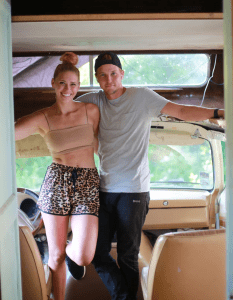
Bay and her fiance, Dave Brown, in an RV they are renovating.
Carrera has been leading Zoom readings of “The Pillowman,” waiting for theaters to open up again. “It’s a tough time,” he said. “There’s a lot of cutting back going on. Teaching is keeping me afloat. I didn’t think I’d be teaching so much. I’ve been teaching at a couple colleges here and there.”
Quigley – who’s an actor, director and video designer – said the latter has come in handy during the pandemic. “Video editing and video work is in high demand, when a lot of shows are being done virtually,” he said. “I prefer doing theater, though, because making films is really, really hard.”
“I have been in a weird position where I have to make sure I can keep paying other people,” Cohn said of the pandemic. “My job, luckily, I’m at a high enough level where I am not really in danger, thank goodness. The really nerve-wracking thing about Covid is figuring out how to pay the staff, so that I don’t have to furlough, lay people off.
“Luckily we have a lot of subscribers who re-subscribed to a season that will come at some point,” she said. “We have an endowment we’re able to tap into to keep all our staff on the payroll. We’ve been very lucky, where we’ve been able to do some digital programming, and people donating. We got a couple major Covid relief grants, which are very exciting right now. There’s a lot out for individual artists.”
“We haven’t had to lay off any staff since the pandemic started and I hope we’ll be able to keep that going until next year, when we can have in-person again,” she said.
Looking forward to life post-pandemic
Myatt still has offered live theater at PV, but she asked what the theater industry will be once the pandemic is over, in a new normal.
“I am just praying I don’t have to watch a bunch of plays about Covid, where everyone is wearing masks,” Consamus said. “My biggest fear is all these playwrights now are sitting at home and writing all these plays about Covid, and I don’t want to watch them.”
“I’m hoping that once we can come back, things in terms of representation and equality and accessibility will actually happen,” Pauly said. “Myself and the other girls in ‘Six’ have started conversations about creating a way to make Broadway tickets easily accessible for people who might never get to see a Broadway show in their life.”
“All the major theaters have been having two discussions during the pandemic – how do we survive Covid and how do we come out on the other side a less racist institution?” said Cohn.
“The institutions of the country are inherently racist in how they were built,” she said. “The performing arts is one of those institutions. So figuring out how our hiring practices can change – do we have to require a college education to get the front-of-house manager at the theater? Probably not. You have to be pleasant with people, but that doesn’t require a B.A.”
“It’ll be interesting; all the older, generally white leaders of these institutions are saying the right things right now,” Cohn said. “But when we come back and it’s about drastically trying to sell tickets again, to make up for a lot of lost revenue, if anything will actually change. The older white patrons are the ones who subscribe, and who buy tickets to all the theaters.”
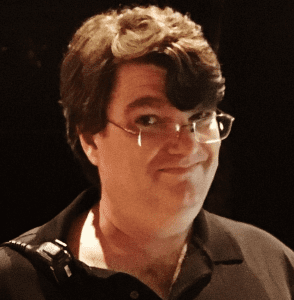
Craig Aves
“Can we program differently? Can we offer tickets differently? Can we market the shows differently to get more different people, in every aspect – in the audience, on the board, in the donor pool, the leadership? I hope so.”
“A lot of us are absolutely hungry for live theater again and I really hope our audiences are too,” Holmes said. “This pandemic has made us all a little more creative in how we present theater. I hope some of that creativity and new ideas and technology can be implemented, to reach wider audiences in the future.”
“I hope that artists can continue to negotiate for better living wages, and health care,” she said. “I work a lot of independent contractor jobs and they’re just terrible jobs. I would hope to have artists become more collective bargaining.”
“I like to think when we come out on the other side of this pandemic, that leaders are forced to innovate a little,” Quigley said. “Right now, theater and entertainment as a whole is at a place where people view it as a bit unnecessary.”
“When the world falls apart, it’s always the part that goes by the wayside first,” he said. “I think even when things start to turn around a bit, theater people will jump and leap to get to the next show when it opens. In terms of getting more mainstream audiences, I think we’re going to have to innovate and challenge ourselves to think of new ways to do shows. I think we’ll be able to use a lot of what we’ve learned the past year or so about incorporating virtual elements, as well as different recording techniques.
“I hope Zoom shows don’t stick around afterwards, but who knows,” Quigley said. “My hope is this pandemic will lead to more innovative and interesting theater that we haven’t seen before.”
Aves said that shifting the Broadway schedules to be more humane would help, “because eight shows a week is draining, for everyone,” he said. “And as we get up to speed, why don’t we build the next audience?”
“I would hope that our city, state and federal legislatures are able to realize there are almost 97,000 jobs in theater in New York City. We as a business netted $14.7 billion – that’s like a huge industry,” Bashor said.
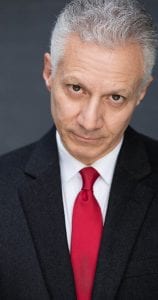
Michael Vincent Carrera has worked as an actor and director in TV, theater and film. (Jenelle Shamrell Photography)
“And when airlines and other companies are getting these huge bailouts from the government, and they’re giving nothing to the arts,” she said. “I hope the economic impact that has – not only in Midtown, but how it trickles out into New York in general, is enough for lawmakers to see the arts are not only something that provides respite for people, and provides joy, but provides jobs. And that they’d be willing to invest in it in the future.”
The Broadway League has joined with leaders in Congress to call for passage of the “Save Our Stages” Act. The bill (S. 4258), introduced by Senators John Cornyn (R-TX) and Amy Klobuchar (D-MN), provides vital support for performing arts venues that have lost nearly 100% of their revenue since the pandemic began in March.
“Broadway in NYC and our presenters and venues in every state are facing the worst crisis in our history,” Charlotte St. Martin, president of the Broadway League, has said. “Our vibrant national industry provides hundreds of thousands of jobs, supports small local businesses and generates $20 billion of economic impact in NYC and in over 200 cities nationally each year. We are urging Congress to pass the Save Our Stages Act and support live theatre across the country,.”
In the 2018-2019 season, Broadway attendance reached a record high of 14.8 million admissions, topping the attendance of the 10 professional New York and New Jersey sports teams combined. The 2018-2019 season saw record breaking attendance on the road with 18.5 million admissions for touring Broadway shows, contributing $3.8 billion to local markets across the U.S.
Broadway performances were suspended due to due to Covid on March 12, 2020. At that time, 31 productions were running, including 8 new shows in previews. Additionally, 8 productions were in rehearsals preparing to open in the spring.
“For me, the most important things are accessibility and inclusivity, so I’m really hoping that happens,” Kurth said. “And just the health of people – how you treat yourself when you’re sick.”
“Now we know so much more about aerosols, and that wasn’t good,” she said of coronavirus. “Hopefully, there are ways to treat people better when we’re sick and not be a risk of spreading more things, not just Covid.”
“I wish our American theater would be more than Broadway and the American musical,” Carrera said. “I wish we’d find a way to find movements in other cultures and times, that brought storytelling to other places, and gave a chance to new voices – all voices. To venues that aren’t even theaters. Start to think outside the box, because our theater is so driven by the commercial, by the top of the food chain.
“I’d really like to see some of that food start to dwindle down to the rest of the chain,” Carrera said. “That’s where some of the most innovative stuff happens, when we get away from the highly commercial.”
Everything’s “relative” at Pleasant Valley
For the panel, Myatt created a private Facebook group, inviting about 20 people to participate – either PV alums or theater friends of hers. It was much easier to schedule compared to pre-Covid times, when everyone would have been much busier.
“I find that people are very willing to give of their time; I never want to take that for granted,” Myatt said afterward. “It was nice to see as
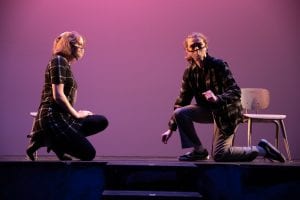
PV’s “Theory of Relativity” featured Ava Burmahl, left, and John Warndahl. (Jenelle Shamrell Photography)
many alumni who were there.”
“In the future, after the pandemic is over, it’s a really hard decision as students, to go into the arts — because the arts are suffering,” she said. “We hope everything comes back, but is that a good career decision? Artists recognize we have to encourage the next generation of artists, take some time to get back to where we want. There’s a lot of push for inclusivity, new voices, and we have students who want to be part of that.”
The director wants to encourage her students, showing that you can grow up in small-town Iowa, and still make it in show business.
Myatt saw Pauly perform “Six” last year at Chicago Shakespeare Theater.
“It was amazing,” she said. “We were hoping it will go to Broadway. I think it’s something, especially when you’re looking for those younger markets, it’s something very attractive to younger people. That was just a slam dunk.”
“It’s a very intelligent piece,” Myatt said. “If you’re a young person, it’s music that they love. That will be a huge hit on Broadway when it’s there.”
In an October 2019 interview, Pauly said of her stage career: “It is an absolute dream come true. I had a rough ending to my 2018 with a
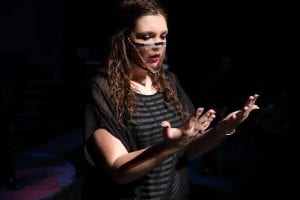
“The Theory of Relativity” featured Abigail Shamrell. (Jenelle Shamrell Photography)
national tour abruptly getting canceled. I had honestly begun to think about quitting theatre and was figuring out other possible career paths. To all of a sudden know that I’m going to be originating a role in a Broadway show, to talk to my agent about going to the Tonys, to discuss making an original Broadway cast recording, it is just unfathomable to me.”
This fall, Myatt directed an unusual PV production of the musical “The Theory of Relativity,” which had two separate 13-member casts, one performing the last weekend of October and the other the first weekend in November – all sporting clear plastic masks.
“It went very well,” she said this week. “We feel very comfortable at the school, cases have been very low. It’s a show that’s able to be socially distanced, which gave them an opportunity to do something that is not the norm, usually don’t do in the high school – with two casts, so we had built-in understudies.”
“It was an opportunity for them to learn from each other — rather than something this is better or worse, we can do two separate interpretations of the material,” Myatt said. “That was great for them…They really had to learn the importance of ensemble work, not just being there in background, but it’s an active participant in everything going on. Everyone was in the whole show.”
The content of the moving show also was pertinent to current events, the veteran director/choreographer said. In the seemingly unrelated collection of songs, scenes and monologues, Theory of Relativity introduces “a compelling array of characters experiencing the joys and heartbreaks, the liaisons and losses, the inevitability and the wonder of human connection,” according to a synopsis.
“We’re all connected in some way,” Myatt said. “There are moments we feel most alone, and share those stories. But we are all interconnected in one way or the other. We share a lot of human feelings.”
“We hope our audiences walked away with a feeling of hope, that they’re not alone,” she said. “That’s perfect for this time.”
Each cast had three live performances in the theater, which was limited to 20 percent of capacity – or 100 patrons maximum, separated in groups of 2-4 people, required to wear masks, with at least one row of empty seats between them, Myatt said. The largest of any audience was 80 people, she said, noting the Thursday night performances were recorded and streamed online on the two Friday nights. The 90-minute
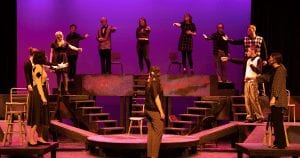
Scenes from Pleasant Valley’s fall musical “The Theory of Relativity.” (Jenelle Shamrell Photography)
musical also was done without an intermission.
“It was kind of neat; we wanted to make sure students could have the opportunity to participate no matter their circumstances,” Myatt said, noting one student who has been doing school totally online was recorded singing from home and her part was projected during the show.
“We projected her video, and it looked like she was there singing,” she said. “It could have been live in another room. We saw her and heard her.”
The “Relativity” orchestra was just a four-person combo, not in the orchestra pit, but in front of the stage, all masked. The actors wore clear masks.
There also were different cleaning precautions for costumes, hair and makeup, Myatt said. “Everybody was provided their own makeup — it was an interesting task for makeup and hair folk. They couldn’t do people’s makeup and hair, but they made how-to instructional videos, how to apply their makeup.”
Grace Engstrom was in the gray cast of “Theory of Relativity,” the second weekend. The main challenges were adjusting to singing with the masks and working with two different casts.
“Trying to navigate doing two different shows was very different,” Grace said. “Not rehearsing as much was harder for memorizing songs and lines. I think it worked out well in the end.”
“It was really cool how everyone had their featured moment in the show, so it gave everyone a chance to stand out,” she said. “And it was good to have another cast to kind of bounce ideas off of – seeing my counterpart perform the part a different way was really interesting and it definitely gave me ideas of how I could personally perform my part in the show.”
It was very different to have such small audiences, Grace said.
“Knowing the people we really loved, our parents and grandparents, were going to see it, was still really good for us, even though it wasn’t as big as what we might be used to,” she said. “We still put our full effort in, because that’s what you have to do.”
Grace said the actors were kept at a distance from each other on stage. “Mrs. Myatt did a very good job of making sure we were following those guidelines as much as possible, while still being able to put on a very good show.”
The drama department is continuing to be busy, as it’s planning to perform a holiday cabaret fundraiser this month, a children’s show in January (“The Velveteen Rabbit”) and a pre-recorded “Feiffer’s People,” a series of sketches and monologues in late February.
Myatt also plans to do a spring play, the classic “Our Town,” which can’t be streamed or recorded, according to its licensing company.
Depending on the weather at the time, in April, she may stage it outdoors.
“I think everybody is doing the best we can, looking for ways to find opportunities for students,” Myatt said of area student theater productions. “The platform we used allows for donations to the department. While people were not able to bring as many people, they understand the importance of this for students.”
The holiday cabaret will be recorded from performers’ homes, and shown completely online, starting Dec. 19, for two weeks, and the school will ask for $5 per viewing, Myatt said.
Its limited revenue this year matches lower expenses, since the theater kids didn’t travel to Iowa Thespian Festival, canceled last month at University of Northern Iowa, and done virtually.
“The fees for that were much less, and we’re not having to pay for transportation, lodging or food,” Myatt said.
“It’s a whole new world, but some of them gained some neat skills,” she said. “Though it’s different, it still gives them an outlet.”
Like many schools, PVHS’ student body is split into two main groups, with one in person for classes Monday, Wednesday and every other
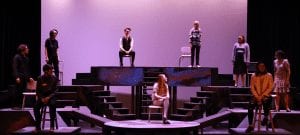
Scenes from Pleasant Valley’s fall musical “The Theory of Relativity.” (Jenelle Shamrell Photography)
Friday, and the other Tuesday, Thursday, and every other Friday, with early dismissal every Friday.
In the spring, theater students usually do a cabaret, and people submitted videos this past spring – including parents, siblings and alumni. Sam Pauly and Whitney Bashor participated, Grace said.
This month, everyone will submit videos as well, including Grace and her sister. “Covid has hit us all so hard, we figured having that extra holiday spirit could help bring everyone together and add a little more holiday cheer to the crazy corona holiday season,” she said.
It’s important to raise money since they weren’t able to sell as many tickets as usual or do as many fundraisers, Grace said. “It would be a fun way to get people in the holiday spirit, while also working to get new lights we’re looking at getting for our stage,” she said.
The cabaret will be posted on their show website, www.showtix4u.com/event-details/43207, available from Dec. 19-31, as well as on PV drama social media.
Grace has been doing theater since 6th grade, when she was in “Chitty Chitty Bang Bang” at Music Guild, and has done theater all through junior high and high school. Her favorite show was “Carrie the Musical” they did last year, where she played the main antagonist and took it to Iowa Thespian Festival.
Of theater, she treasures the community.
“I love performing and telling a story, but being part of that community, seeing how a show can affect people, is really amazing to me.”



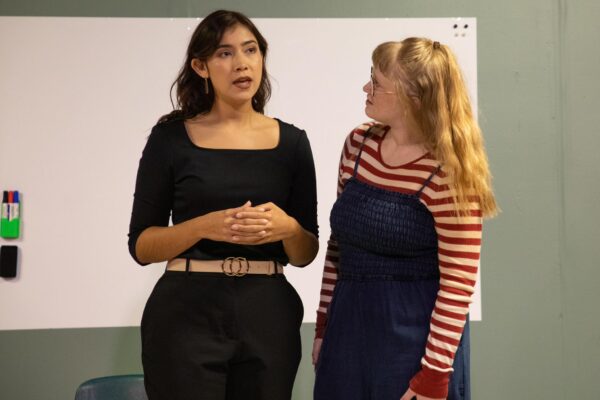
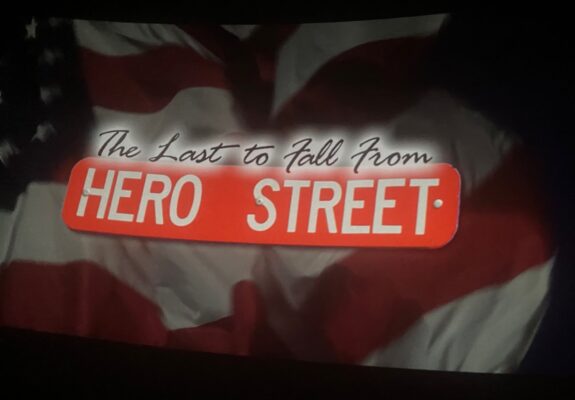
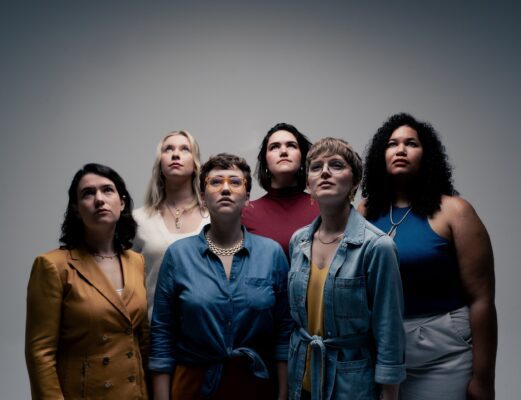







Leave a Reply
You must be logged in to post a comment.